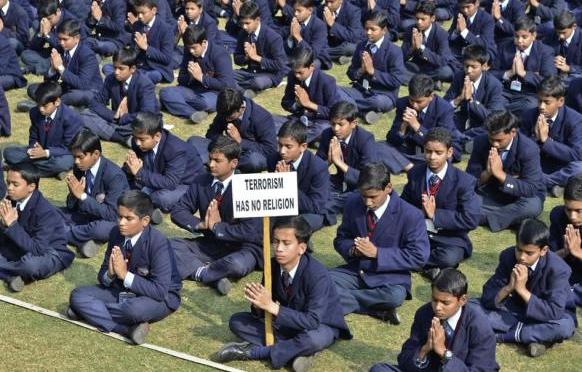 Syona Puliady is a sophomore international studies major.
Syona Puliady is a sophomore international studies major.
Radha-Krishna—the Hindu tale of eternal love that survived the fate that kept them physically apart. Growing up together, mutual feelings of love and respect developed through their games, music, and even their fights. The two were so close that they became known as two bodies sharing one soul; but despite this bond, they could never be with one another. As Radha was already married and Krishna had his duties as Supreme Ruler, there was no place left for them to be together. Though they could not be as one, their unquestionable devotion to each other remained.
The story of Radha-Krishna is taken by some as just another Hindu myth, but it actually holds a lot of relevance to Indian politics. As two bodies thought of as one separated by fate, the story almost exactly parallels the relationship between Pakistan and India. With the exception of the years since partition, the two countries shared their history and culture—but instead of leaving behind love, respect, and devotion after being pulled apart like Radha-Krishna, it seems as though only hate and anger remain.
As a Hindu Indian, it has been expected of me from the time I was born to share this ancestral animosity of Pakistanis. But when 132 children and 13 adults were killed in Peshawar, Pakistan by the Tehrik-i-Taliban, I cried for three days.
The attack took place in Army Public School, a military school in northwest Pakistan. Children from the young ages of eight to eighteen had their lives stolen. Reading the reports of the parents who lost their children in the devastating attack was absolutely horrifying and it is impossible to even imagine their suffering. As someone who wants to work with families who have been affected by terrorism, this made me question what I could do to help the grieving families from here.
Initially, I was worried about what the Hindu nationalists of India would have to say about the attack. Notorious for passionately hating Muslims and Pakistanis, I thought they would be able to convince Hindu Indians to keep a blind eye toward Peshawar. But this was not the case. Hindu Indians from all parts of the world stood behind Pakistanis as they mourned for their loss. India’s Prime Minister Modi asked every school in India to pay their respects to Pakistan’s tragedy as a mark of solidarity. Social media blew up with the hashtag #IndiaWithPakistan, showing the world that there is empathy and support for our brothers and sisters across the border—regardless of whatever politicians tell us about each other.
Both Pakistanis and Indians have suffered greatly from their own peoples’ hatred in less than one hundred years; it makes no sense to continue fueling hostile emotions. As both countries are plagued by some degree of violence, it is the responsibility of both sides to stand in solidarity when one country faces the horrifying reality of it. Like Radha-Krishna, unification of both sides may not be what fate has in store. But as Radha-Krishna’s love has transcended eternity, I think there’s still time to search for peace between Pakistan and India.
Photo Credit: REUTERS/K. K. ARORA

